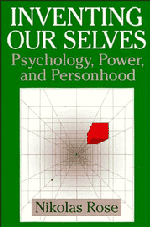Book contents
- Frontmatter
- Contents
- Acknowledgments
- Introduction
- 1 How should one do the history of the self?
- 2 A critical history of psychology
- 3 Psychology as a social science
- 4 Expertise and the techne of psychology
- 5 Psychology as an individualizing technology
- 6 Social psychology as a science of democracy
- 7 Governing enterprising individuals
- 8 Assembling ourselves
- Notes
- Bibliography
- Index
8 - Assembling ourselves
Published online by Cambridge University Press: 04 August 2010
- Frontmatter
- Contents
- Acknowledgments
- Introduction
- 1 How should one do the history of the self?
- 2 A critical history of psychology
- 3 Psychology as a social science
- 4 Expertise and the techne of psychology
- 5 Psychology as an individualizing technology
- 6 Social psychology as a science of democracy
- 7 Governing enterprising individuals
- 8 Assembling ourselves
- Notes
- Bibliography
- Index
Summary
The idea of ‘the self’ has entered a crisis that may well be irreversible. Social theorists have written countless obituaries of the image of the human being that animated our philosophies and our ethics for so long: the universal subject, stable, unified, totalized, individualized, interiorized. For some accounts, in particular those inspired by psychoanalysis, this image was always ‘imaginary’: humans never existed, never could exist in this coherent and unified form – human ontology is necessarily of a creature riven at its very core. For others, this ‘death of the subject’ is itself a real historical event: the individual to which this image of the subject corresponded emerged only recently in a limited time-space zone, and has now been swept away by cultural change. In the place of the self, new images of subjectivity proliferate: as socially constructed, as dialogic, as inscribed upon the surface of the body, as spatialized, decentered, multiple, nomadic, created in episodic recognition-seeking practices of self-display in particular times and places.
The hypotheses that I have put forward in this book should certainly be located within this problem space. However, I have also tried to address myself to a reciprocal set of problems concerning ‘the self’: the peculiar fact that at the very moment when this image of the human being is pronounced passé by social theorists, regulatory practices seek to govern individuals in a way more tied to their ‘selfhood’ than ever before, and the ideas of identity and its cognates have acquired an increased salience in so many of the practices in which human beings engage.
- Type
- Chapter
- Information
- Inventing our SelvesPsychology, Power, and Personhood, pp. 169 - 198Publisher: Cambridge University PressPrint publication year: 1996
- 3
- Cited by

